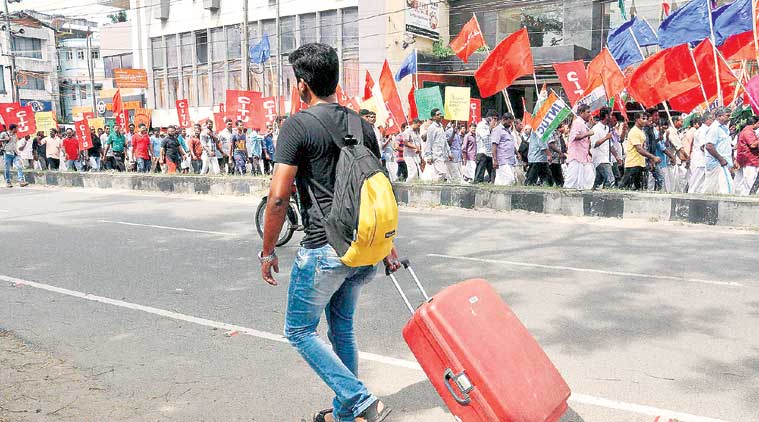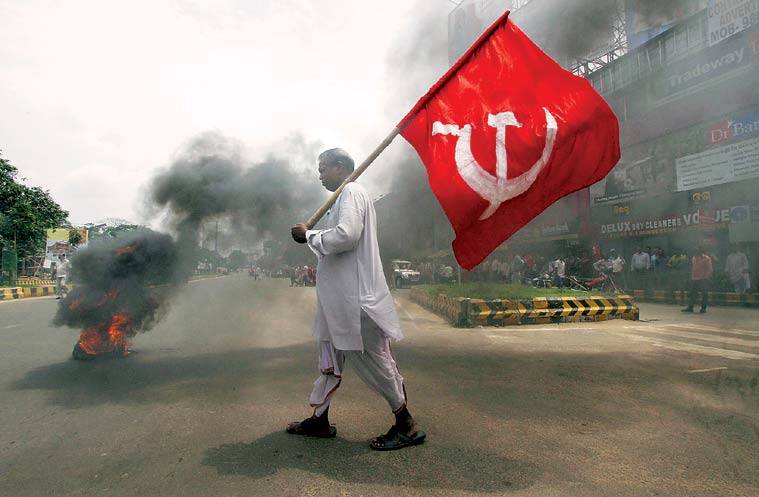15 crore workers on strike: Bharat bandh halts life, spurs violence
A daylong nationwide strike called by 10 central trade unions on
Wednesday disrupted normal life in various parts of the country with
coal production, banking opérations and transport services being hit the
most. The day also witnessed violent clashes in Odisha and West Bengal.
Banking services were among the worst-hit by the bandh as 23 public
sector banks, 12 private sector banks, 52 regional rural banks and over
13,000 cooperative banks joined the stir.
Nearly half of state-run Coal India’s daily production of 1.7 million
tonne was hit, as a majority of around four lakh coal workers joined the
agitation.
However, power generation and other utility services remained largely normal.
 Kochi
Kochi
Union leaders claimed that over 15 crore workers from the organised
sector took part in the agitation. The trade unions had called the
strike to protest against changes in labour laws and PSU privatisation
among other issues.
The impact of the strike was most visible in West Bengal, Tripura, Kerala, Karnataka, Puducherry and Odisha. The bandh s
aw partial success in Delhi, Punjab, Haryana, Tamil Nadu, Goa, Gujarat,
Bihar and Jharkhand. Normal life was also affected in Assam, Andhra
Pradesh, Telangana and Rajasthan.
The strike had little impact in the country’s financial capital Mumbai, except in the banking sector.
In West Bengal, over 1000 people were arrested after Left and TMC
workers clashed. Around 300 people were taken into custody in different
parts of Odisha as a preventive measure, but were released later.
 Bhubaneswar
Bhubaneswar
Train services of South Eastern Railway and Eastern Railway were partially affected.
The unions’ demands include urgent measures to rein in price rise,
containing unemployment, strict enforcement of basic labour laws,
universal social security cover for all workers and minimum wage of Rs
15,000 per month.
They are also demanding higher pensions, stopping of disinvestment in
PSUs, end to contract system, removal of ceiling on bonus and provident
fund, compulsory registration of trade unions within 45 days, no
unilateral amendment to labour laws and stopping of FDI in railways and
defence.
Trade unions said the strike was a “grand success” and added that they
would decide their future course of action depending on the government’s
response.
General secretary of All India Trade UnionCongress Gurudas
Dasgupta said: “Support for the strike shows how disenchanted people
are with the government’s anti-worker policy and its failure to contain
food prices and contain the economic slowdown.”
The Centre of Indian Trade Unions said: “Over 15 crore workers employed
in almost all sectors of the country’s economy… participated in this
strike. Protest demonstrations, rasta roko and rail roko were held
across the country.”
The Labour Ministry, however, maintained that the strike had little
impact in most parts of the country. “The situation remained, by and
large, normal and peaceful across the country. Most of the employees
attended their offices. Trains, buses, auto rickshaws, lorries plied as
usual. There has been minimal effect,” it said in a statement.
Finance Minister Arun Jaitley, who had led the negotiations with the trade unions on their demands, said the strike had “marginal or inconsequential impact.”
 Mumbai
Mumbai
Congress blamed the government’s “utter apathy” for the agitation. “It
seems just as the Britishers wanted to benefit the East India Company at
the expense of millions of labourers of this country, the Modi
government wants to benefit 5-6 crony businessmen friends of this
government”, party spokesperson Abhishek Singhvi said.
The CPM termed the strike “magnificent” and said it was “successful”
despite the Centre trying to “dissuade” workers from proceeding with the
agitation. “Apart from RSS-affiliated Bhartiya Mazdoor Sangh, they
could not succeed in dissuading any other central trade union,” the
party said in a statement.
RSS affiliate Bharatiya Mazdoor Sangh and National Front of Indian Trade
Unions had withdrawn from the strike, saying that they would “give the
government time to deliver on its promises”.
The Confederation of Indian Industry termed the nationwide strike as “disruptive and uncalled for”.
Source:http://indianexpress.com/
No comments:
Post a Comment